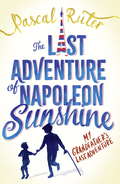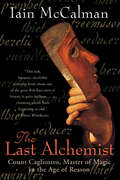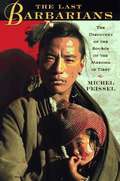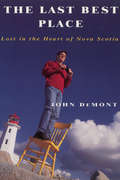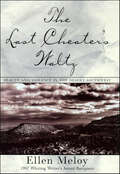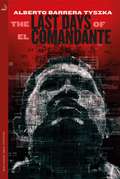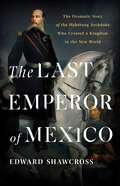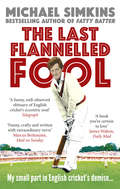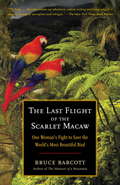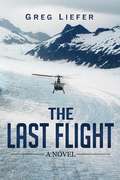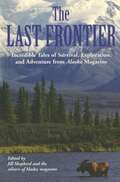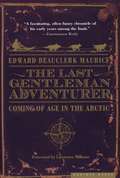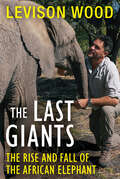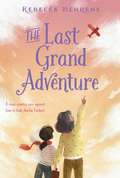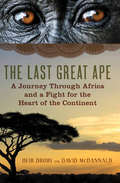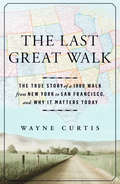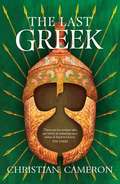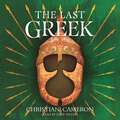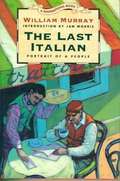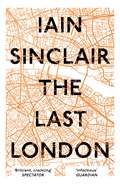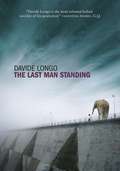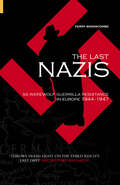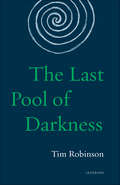- Table View
- List View
The Last Adventure of Napoleon Sunshine: a heartwarming, uplifting novel about the importance of family
by Pascal RuterAt the age of eighty-five my grandfather Napoleon decided he needed to try something new . . . Everything starts to go south when Napoleon leaves his wife. An eighty-five-year-old former boxer with a restless, youthful spirit, Napoleon decides to say to hell with it all! He wants a new life. With his ten-year-old grandson Leonard Sunshine, he embarks on a moving adventure, a rebellion against everything that takes the fun out of life. Above all, Leonard is determined to spare his grandfather the fate of the elderly - his final years spent exiled in a retirement home. The chaotic duo adopt a dog, drive a fake taxi, escape to the seaside, sabotage door-to-door salesmen and plot to kidnap a famous radio star. From the heart of Paris to the coast of Normandy, The Last Adventure of Napoleon Sunshine is a moving, life-affirming and melancholy tale of new beginnings and the importance of family.
The Last Alchemist: Count Cagliostro, Master of Magic in the Age of Reason
by Iain McCalmanFreemason ... Shaman ... Prophet ... Seducer ... Swindler ... Thief ... HereticWho was the mysterious Count Cagliostro?Depending on whom you ask, he was either a great healer or a dangerous charlatan. Internationally acclaimed historian Iain McCalman documents how Cagliostro crossed paths -- and often swords -- with the likes of Catherine the Great, Marie Antoinette, and Pope Pius VI. He was a muse to William Blake and the inspiration for both Mozart's Magic Flute and Goethe's Faust. Louis XVI had him thrown into the Bastille for his alleged involvement in what would come to be known as "the affair of the necklace." Yet in London, Warsaw, and St. Petersburg, he established "healing clinics" for the poorest of the poor, and his dexterity in the worlds of alchemy and spiritualism won him acclaim among the nobility across Europe.Also the leader of an exotic brand of Freemasonry, Count Cagliostro was indisputably one of the most influential and notorious figures of the latter eighteenth century, overcoming poverty and an ignoble birth to become the darling -- and bane -- of upper-crust Europe.
The Last Barbarians
by Michel PeisselMore than thirty years ago, Michael Peisel's classic, Mustang: A Lost Tibetan Kingdom, introduced the world to a region more isolated than the deepest Amazon. Against the odds--and in the tradition of the nineteenth-century explorers of whom he is a direct descendant--Peissel has combed Tibet for forty years and has come to know one of the last nomadic peoples on earth to live with what he calls a "Stone Age memory."In 1994, seizing the rarest of opportunities to journey deep into occupied Tibet, he accomplished what scores of Western explorers had tried and failed to do for more than a hundred years: He found the source of the Mekong River in the ice-strewn fields on the "roof of the world."This immensely readable account tells how a small group of modern adventurers made history not once, but twice, in the course of a single year: by accurately charting the origins of one of Asia's most majestic and storied waterways and by finding a living fossil, the Riwoche horse, a species unknown to contemporary zoology that may prove to be a missing link in equine evolution.The book's stage is forbidden Tibet--with its tragic politics, its natural wonder, and its fiercely independent nomadic tubes, who are known to the chinese as "the last barbarians."
The Last Best Place: Lost In The Heart Of Nova Scotia
by John DemontA writer returns to Nova Scotia, and finding it almost unrecognizable, sets out to capture the essence of his ancestral province--a place as strange and wild as anywhere on the continent. John DeMont visits places as diverse as a Buddhist abbey; the first free black settlement outside Africa; an island that harbours pirate treasure; and a backwoods barndance where the music of 18th-century Scotland lives on. He visits tuna smugglers and moonshiners; the brooding painter Alex Colville; spiritual seekers from Japan, the US and Europe; and Anne Murray's greatest Austrian fans. He also races yachts with summer residents; patrols the coast for drug smugglers with the Mounties; and casts for salmon with the wisest fishing guides. A road book with a difference, and an endearing search for home,The Last Best Placeis wry and wise, as quirky and lively as Nova Scotia itself.
The Last Cheater's Waltz: Beauty and Violence in the Desert Southwest
by Ellen MeloyFrom the recipient of the 1997 Whiting Award.Feeling disconnected from the wildly beautiful desert that she has known intimately for twenty years, award-winning writer Ellen Meloy embarks on a search for home that is historical, scientific, and spiritual. Her "Map of the Known Universe," devised to guide her quest, reveals extraordinary details of a physical link between the atomic age and her home on Utah's San Juan River. The Map grows to include Los Alamos, the Trinity A-test site, White Sands Missile Range, and primary sources of uranium.Meloy casts her naturalist's eye on the Southwest's "geography of consequence," where she finds unusual local bestiaries, the bodies of long-buried neighbors, an underground bubble of nuclear physics in a national forest, and the rich textures of nature on her own eight acres of land. The Last Cheater's Waltz: Beauty and Violence in the Desert Southwest is multilayered and far-reaching, yet always infused with Meloy's prodigious research, finely tuned prose, and wry humor.
The Last Days of El Comandante (Latin American Literature In Translation Ser.)
by Alberto Barrera TyszkaVenezuela 2012: The President's illness casts a shadow over the lives of his citizens - he divides opinion, but life without him is almost unimaginable. Miguel Sanabria is a retired oncologist, ambivalent towards the President but caught between a virulently anti-Chávez wife and a equally vehement pro-Chávez brother. He is asked by his nephew to hide a mobile phone carrying secret footage that could shed new light on the President's condition.His neighbour Fredy has found a fresh angle for a new book about Chávez, but to take advantage he must agree to a "green-card" marriage and leave his girlfriend and their son for two months, even as their landlady plots to repossess their home.In another apartment live nine-year-old María and her neurotic, near-agoraphobic mother. Taken out of school to be educated at home, María turns to internet chat rooms for company, while her mother's fears about the city's endemic violence are proved tragically prescient.The fates and fortunes of these neighbours will prove inextricably entwined as the hour of the President's death draws ever closer.REVIEWS FOR THE SICKNESS"A great book" Michael Morpurgo"Powerful themes and powerful writing" Susan HillTranslated from the Spanish by Rosalind Harvey
The Last Emperor of Mexico: The Dramatic Story of the Habsburg Archduke Who Created a Kingdom in the New World
by Edward ShawcrossThe true operatic tragedy of Maximilian and Carlota, the European aristocrats who stumbled into power in Mexico—and faced bloody consequences.In the 1860s, Napoleon III, intent on curbing the rise of American imperialism, persuaded a young Austrian archduke and a Belgian princess to leave Europe and become the emperor and empress of Mexico. They and their entourage arrived in a Mexico ruled by terror, where revolutionary fervor was barely suppressed by French troops. When the United States, now clear of its own Civil War, aided the rebels in pushing back Maximilian&’s imperial soldiers, the French army withdrew, abandoning the young couple. The regime fell apart. Maximilian was executed by a firing squad and Carlota, secluded in a Belgian castle, descended into madness.Assiduously researched and vividly told, The Last Emperor of Mexico is a dramatic story of European hubris, imperialist aspirations clashing with revolutionary fervor, and the Old World breaking from the New.
The Last Flannelled Fool: My small part in English cricket's demise and its large part in mine
by Michael SimkinsMichael Simkins is the ultimate Sunday cricketer - passionate, obsessive, technically inept, and hopelessly deluded. When an injury rules him out of an entire season, not only might it spell the end of his long career, he is faced more immediately with a summer aimlessly wandering garden centres and listening to The Archers. He decides instead to set off on an odyssey across the counties of England in search of that golden time in his youth when his passion for the game was first kindled. It's a journey that begins in May in light drizzle at the birthplace of cricket, takes in the burial site of his favourite ground (now a Marks & Spencer) and even stops along the way to flirt with the love child of WG Grace and Kerry Katona that is Twenty20. It ends with the ultimate cricketing zenith - returning to the field of play to bowl an over to Freddie Flintoff in fading light in front of a capacity crowd. So can cricket still bring comfort and meaning to his life or is Old Father Time about to call for Michael's bails?
The Last Flight of the Scarlet Macaw
by Bruce Barcott"The first time we came here I didn't know what to expect," she told me as we paddled upstream. "What we found just blew me away. Jaguars, pumas, river otters, howler monkeys. The place was like a Noah's Ark for all the endangered species driven out of the rest of Central America. There was so much life! That expedition was when I first saw the macaws."As a young woman, Sharon Matola lived many lives. She was a mushroom expert, an Air Force survival specialist, and an Iowa housewife. She hopped freight trains for fun and starred as a tiger tamer in a traveling Mexican circus. Finally she found her one true calling: caring for orphaned animals at her own zoo in the Central American country of Belize. Beloved as "the Zoo Lady" in her adopted land, Matola became one of Central America's greatest wildlife defenders. And when powerful outside forces conspired with the local government to build a dam that would flood the nesting ground of the last scarlet macaws in Belize, Sharon Matola was drawn into the fight of her life. In The Last Flight of the Scarlet Macaw, award-winning author Bruce Barcott chronicles Sharon Matola's inspiring crusade to stop a multinational corporation in its tracks. Ferocious in her passion, she and her confederates-a ragtag army of courageous locals and eccentric expatriates-endure slander and reprisals and take the fight to the courtroom and the boardroom, from local village streets to protests around the world. As the dramatic story unfolds, Barcott addresses the realities of economic survival in Third World countries, explores the tension between environmental conservation and human development, and puts a human face on the battle over globalization. In this marvelous and spirited book, Barcott shows us how one unwavering woman risked her life to save the most beautiful bird in the world. "Barcott's compelling narrative is suspenseful right up to the last moment." -Publisher's Weekly"An engrossing but sad account of a brave and quirky champion of nature."-Kirkus"...A riveting account of one woman's fight to save one of the last bastions of an endangeredSpecies. . . Barcott writes of international politics, ecology and endangered species, and human relations with equal facility. This real page-turner of narrative nonfiction is hard to put down."-BooklistFrom the Hardcover edition.
The Last Flight: A Novel
by Gregory P. LieferSet against the harsh beauty of Alaska, a veteran helicopter pilot is torn between ending his own embattled life and rescuing survivors from a mountain plane crash.Last Flight is the heroic story of Gil Connor, a senior Army helicopter pilot and aging Vietnam vet, as he struggles with an impending terminal illness and the desire to pull off one last daring rescue. Connor finds himself in a constant battle against his internal demons during his quest to reach the survivors of a remote, civilian commuter-plane crash deep in the Alaskan mountains-a rescue that perhaps only he can pull off.The stranded plane’s captain, Scott Sanders, takes charge after the crash, in spite of his injuries and the realization that his dream of flying for a major airline is destroyed. One of the passengers, a retired school teacher, assists him while barely holding herself together; her husband was killed in a fiery plane crash years before. They soon realize that time is not on their side in the Alaskan polar climate.Connor, who’s haunted by the horrors of war and a turbulent past, is torn between ending his life before the inevitable and saving the marooned crash victims before it’s too late. His underlying intentions are unknown, even to himself, until the very end. Aided by an untested protégée and a mysterious young girl found at the crash site, Connor struggles in a desperate gamble to achieve the near impossible. Amid the turmoil of an approaching storm and almost certain failure, his flying skills and drive for redemption are the only hopes that remain.Skyhorse Publishing, as well as our Arcade, Yucca, and Good Books imprints, are proud to publish a broad range of books for readers interested in fiction-novels, novellas, political and medical thrillers, comedy, satire, historical fiction, romance, erotic and love stories, mystery, classic literature, folklore and mythology, literary classics including Shakespeare, Dumas, Wilde, Cather, and much more. While not every title we publish becomes a New York Times bestseller or a national bestseller, we are committed to books on subjects that are sometimes overlooked and to authors whose work might not otherwise find a home.
The Last Frontier: Incredible Tales of Survival, Exploration and Adventure from Alaska Magazine
by Jill Shepherd Alaska Magazine<p>Since 1935, Alaska magazine has charted the development of our biggest, most mysterious state. With compelling stories on such events as earthquakes, tidal waves, grizzly and polar bear attacks, the Russian influence, the Gold Rush, the Japanese invasion of the Aleutians during World War II, hunting and fishing, the lives of sourdoughs, village life, and much more, The Last Frontier truly captures the essence of our largest state. <p>Other chapters include the tale of the Eskimo commercial pilot, flying villagers across the Arctic. Or the one about the young woman who conducted the 1940 census in the Interior by dog team. Or the story about the family who placed their automobile on a raft, hooked paddles to the axles, and steered their home-built paddle-wheeler down the Yukon River to the first road-whereupon they removed the car from the barge, and drove home to Nebraska.Other stories you won't want to miss in this book include: Don Sheldon's floatplane rescue of eight men from white water; the mystery of Klutuk, the beast of the tundra; how Julie Collins's sled dog saved her life; the trials and tribulations of a nurse running a hospital on the arctic coast in 1921; an Athabascan writer interviews her grandmother, a medicine woman; newsworthy events across the state and much, much more.</p>
The Last Gentleman Adventurer: Coming of Age in the Arctic (Charnwood Large Print Ser.)
by Edward Beauclerk Maurice"This is a great book about life at remote bases in Canada's far north as seen by a young English boy who went there by himself to see the world and got more than he could have bargained for. Beautifully written." --Sir Ranulph Fiennes"As spare, gleaming, and exhilarating as the Arctic wastes and the gentle, stoic Eskimos who had mastery of this realm . . . The book evokes the frozen seas, whale hunts, snow plains and storms that intimidated those rash enough to brave this world, and the traditions, myths, and hunting skills that contoured a bygone way of life . . . His translucent prose is a sparkling and moving record." -- Times (London)At sixteen, Edward Beauclerk Maurice impulsively signed up with the Hudson's Bay Company -- the Company of Gentleman Adventurers -- and was sent to an isolated trading post in the Canadian Arctic, where there was no telephone or radio and only one ship arrived each year. But the Inuit people who traded there taught him how to track polar bears, build igloos, and survive expeditions in ferocious winter storms. He learned their language and became so immersed in their culture and way of life that children thought he was Inuit himself. When an epidemic struck, Maurice treated the sick using a simple first aid kit, and after a number of the hunters died, he had to start hunting himself, often with women, who soon began to compete for his affections. The young man who in England had never been alone with a woman other than his mother and sisters had come of age in the Arctic.In The Last Gentleman Adventurer Edward Beauclerk Maurice transports the reader to a time and a way of life now lost forever.After serving in the New Zealand navy during World War II, Edward Beauclerk Maurice became a bookseller in an English village and rarely traveled again. He died in 2003 as this, his only book, was being readied for publication. "If you like reality, The Last Gentleman Adventurer will be your cup of tea: a delicious quaff of it. Savor it!" -- Edward Hoagland"Maurice's memoir supplies a fascinating elegy to a vanishing world." -- Telegraph"One of those rare writers who will be remembered for turning out one great memoir/travel book . . . He relates these events in a beautiful prose that is quaintly elegant in tone but never archly so . . . Not only a gentleman but a wonderful writer who limited his output to one book, and perhaps that is why it reads so beautifully." -- Sunday Tribune (Dublin)"Maybe he was exceptional, but the charm of his book lies in its modesty; he makes no claims for himself. His concern was to make a record of some amazing adventures and a vanishing way of life; these are woven into an eye-opening narrative that is suffused with kindliness and an attitude to growing up more restrained but more humane than that prevailing today. A gentleman adventurer indeed." -- Times Educational Supplement"A deceptively simple account of how he grew to manhood, shaped on one hand by the brutal elements of the Arctic, on the other by the compassionate communities of Inuit who understood them . . . This is a beautifully unadorned, homespun tale with a lack of self-consciousness rare in travel literature . . . I was charmed." -- Benedict Allen, Independent on Sunday
The Last Giants: The Rise and Fall of the African Elephant
by Levison WoodFrom the award-winning explorer, “an entertaining summary of what we know about the elephant, and a call to change our behavior to ensure its survival” (Daily Mail).The Last Giants satisfies British explorer Levison Wood’s lifelong desire to learn more about the majestic African elephant. These giants trek through some of Africa’s most magnificent landscapes as they go in search of life-giving waters and pastures. El Nino’s droughts and an insatiable ivory trade have cut African elephant numbers by a third in the last decade alone, and if elephants disappear entirely, Africa’s entire ecosystem could collapse. But Botswana has become a safe haven, where one-sixth of the world’s elephants now reside. Each year their numbers grow and an incredible migration takes place, which Wood witnesses and records. He teams up with local trackers to gain insight into how this iconic species survives, camps out in the wild, meets the people and tribes living on the migration’s path, and joins the park rangers whose job it is to protect these land goliaths, equipped with his “good eye for detail and better ear for dialogue” (The Wall Street Journal).“Adventurer Wood followed elephants on a 650-mile migration across Botswana for a British television program. This fascinating companion volume to that series examines the past, present, and future of the African elephant.” —Library Journal (starred review)“A smart, inviting portrait of elephants from a keen-eyed observer.” —Kirkus Reviews“A rewarding look at the habits and habitats of the African elephant . . . Comprehensively yet accessibly conveying Wood’s lifelong fascination with African elephants, his discussion will appeal to anyone keen on learning more about them.” —Publishers Weekly
The Last Grand Adventure
by Rebecca BehrensTwelve-year-old Bea finds herself on a unique road-trip with her grandmother, as they search for her grandmother’s long-lost sister—the legendary Amelia Earhart—in this charming novel from the author of When Audrey Met Alice and Summer of Lost and Found. <P><P>It’s 1967 and twelve-year-old Bea is in need of some adventure. Her mother is off in San Francisco, while her father has just gotten remarried in Los Angeles. Bea has gained a younger stepsister, and she’s not thrilled about her blended family. So when her ailing grandmother, Pidge, moves to an Orange County senior-living community and asks if Bea would spend the summer helping her get settled, Bea is happy for any excuse to get away. But it turns out, her grandmother isn’t interested in settling in. What she really wants is to hop a train back to Atchison, Kansas—where she thinks she’ll be reunited with her long-missing sister: Amelia Earhart. And she wants Bea to be her sidekick on this secret trip. At first, Bea thinks her grandmother’s plan is a little crazy. But Pidge has thirty years of letters written in “Meelie’s” unmistakable voice, all promising to reunite. <P><P>This might be the adventure Bea needs… With letters in hand, Bea and Pidge set off on their quest to find Amelia. But getting halfway across the country proves to be more of an adventure than either of them bargained for. And their search for Amelia leads to some surprising truths about their family—and each other.
The Last Great Ape: A Journey Through Africa and a Fight for the Heart of the Continent
by Ofir Drori David McdannaldAn epic journey through Africa by a man who fell in love with a magical and disappearing world and then transformed himself into a warrior on the frontline to protect it. Staging heart-pounding, espionage-style raids, Ofir Drori and his organization, The Last Great Ape (LAGA), have put countless poachers and traffickers of endangered species behind bars, and they have fought back against a Kafkaesque culture of corruption. Before Ofir arrived in Cameroon, no one had ever even tried.The Last Great Ape follows a young Ofir on fantastical adventures as he crosses remote African lands by camel, on a horse, and in dug-out canoes, while living with exotic tribes and struggling against nature at its rawest: charging elephants and hyenas, flash floods, and the need to eat river algae and snails to stay alive. The story moves from places of extreme beauty to those of the darkest horror: the war zones of Sierra Leone and Liberia. Ofir begins to work as a photojournalist in order to expose his shocking encounter with war victims and child soldiers. His experiences forge in him a resolution to become an activist and to fight for justice.The search for a cause eventually leads him to Cameroon. When Ofir discovers that no one is fighting to disprove Jane Goodall's dark prophesy that apes in the wild will be extinct in twenty years, he decides that he is the man to step in; because he knows he can make a difference, he sees it as his responsibility. And LAGA is born.The Last Great Ape is a story of the fight against extinction and the tragedy of endangered worlds, not just of animals but of people struggling to hold onto their culture. This book reveals the intense beauty and strife that exist side by side in Africa, and Ofir makes the case that activism and dedication to a cause are still relevant in a cynical modern world. This dangerous and dramatic story is one of courage and hope and, most importantly, a search for meaning.
The Last Great Walk: The True Story of a 1909 Walk from New York to San Francisco, and Why it Matters Today
by Wayne CurtisIn 1909, Edward Payson Weston walked from New York to San Francisco, covering around 40 miles a day and greeted by wildly cheering audiences in every city. The New York Times called it the "first bona-fide walk ... across the American continent," and eagerly chronicled a journey in which Weston was beset by fatigue, mosquitos, vicious headwinds, and brutal heat. He was 70 years old.In The Last Great Walk, journalist Wayne Curtis uses the framework of Weston's fascinating and surprising story, and investigates exactly what we lost when we turned away from foot travel, and what we could potentially regain with America's new embrace of pedestrianism. From how our brains and legs evolved to accommodate our ancient traveling needs to the way that American cities have been designed to cater to cars and discourage pedestrians, Curtis guides readers through an engaging, intelligent exploration of how something as simple as the way we get from one place to another continues to shape our health, our environment, and even our national identity.Not walking, he argues, may be one of the most radical things humans have ever done.
The Last Greek (Commander #2)
by Christian CameronFew writers are better at conjuring up a vision of Ancient Greece' THE TIMES* * * * * * *210BCE.The most powerful empires in the world brawl over the spoils of a declawed Greece.Philopoemen has a vision to end the chaos and anarchy that consumes his homeland - to stop the endless wars and preserve the world he loves. He must resist the urge of the oligarchs to surrender to their oppressors and raise an army to defend his countrymen from the all-conquering powers of Sparta, Macedon and Rome.It is the last roll of the dice for the Achean League. The moment Philopoemen has been training for his whole life.The new Achilles is poised to restore the glory of the former empire. To herald a new era.To become the last great hero of Greece.* * * * * * *Praise for Christian Cameron:'One of the finest writers of historical fiction in the world' BEN KANE'The master of historical fiction' SUNDAY TIMES'A storyteller at the height of his powers' HISTORICAL NOVEL SOCIETY
The Last Greek (Commander #2)
by Christian CameronFew writers are better at conjuring up a vision of Ancient Greece' THE TIMES* * * * * * *210BCE.The most powerful empires in the world brawl over the spoils of a declawed Greece.Philopoemen has a vision to end the chaos and anarchy that consumes his homeland - to stop the endless wars and preserve the world he loves. He must resist the urge of the oligarchs to surrender to their oppressors and raise an army to defend his countrymen from the all-conquering powers of Sparta, Macedon and Rome.It is the last roll of the dice for the Achean League. The moment Philopoemen has been training for his whole life.The new Achilles is poised to restore the glory of the former empire. To herald a new era.To become the last great hero of Greece.* * * * * * *Praise for Christian Cameron:'One of the finest writers of historical fiction in the world' BEN KANE'The master of historical fiction' SUNDAY TIMES'A storyteller at the height of his powers' HISTORICAL NOVEL SOCIETY
The Last Greek (Commander #2)
by Christian CameronFew writers are better at conjuring up a vision of Ancient Greece' THE TIMES* * * * * * *210BCE.The most powerful empires in the world brawl over the spoils of a declawed Greece.Philopoemen has a vision to end the chaos and anarchy that consumes his homeland - to stop the endless wars and preserve the world he loves. He must resist the urge of the oligarchs to surrender to their oppressors and raise an army to defend his countrymen from the all-conquering powers of Sparta, Macedon and Rome.It is the last roll of the dice for the Achean League. The moment Philopoemen has been training for his whole life.The new Achilles is poised to restore the glory of the former empire. To herald a new era.To become the last great hero of Greece.* * * * * * *Praise for Christian Cameron:'One of the finest writers of historical fiction in the world' BEN KANE'The master of historical fiction' SUNDAY TIMES'A storyteller at the height of his powers' HISTORICAL NOVEL SOCIETY
The Last Italian: Portrait of a People (DESTINATIONS)
by William MurrayOffers a candid portrait of the Italian people in a collection of pieces describing events and topics highlighting life in contemporary Italy.
The Last London: True Fictions from an Unreal City
by Iain SinclairA New Statesman Book of the Year London. A city apart. Inimitable. Or so it once seemed. Spiralling from the outer limits of the Overground to the pinnacle of the Shard, Iain Sinclair encounters a metropolis stretched beyond recognition. The vestiges of secret tunnels, the ghosts of saints and lost poets lie buried by developments, the cycling revolution and Brexit. An electrifying final odyssey, The Last London is an unforgettable vision of the Big Smoke before it disappears into the air of memory.
The Last Man Standing: The chilling apocalyptic thriller that predicts Italy's collapse
by Davide LongoA chillingly plausible novel about the collapse of Italian society and one man's struggle to retain his humanity amid the horror"A bleak, lyrical tale that evokes Cormac McCarthy's The Road.... Gruesome, intense, and strange... a eurozone nightmare brought to life on the page."--James Lovegrove, Financial TimesIt is 2025, and Italy is on the brink of collapse. Borders are closed, banks withhold money, the postal service stalls. Armed gangs of drug-fuelled youths roam the countryside. Leonardo was a famous writer and professor before a sex scandal ended his marriage and career. Heading north in search of her new husband, his ex-wife leaves their daughter and her son in his care. If he is to take them to safety, he will need to find a quality he has never possessed: courage.
The Last Man Standing: The chilling apocalyptic thriller that predicts Italy's collapse
by Davide LongoA chillingly plausible novel about the collapse of Italian society and one man's struggle to retain his humanity amid the horror"A bleak, lyrical tale that evokes Cormac McCarthy's The Road.... Gruesome, intense, and strange... a eurozone nightmare brought to life on the page."--James Lovegrove, Financial TimesIt is 2025, and Italy is on the brink of collapse. Borders are closed, banks withhold money, the postal service stalls. Armed gangs of drug-fuelled youths roam the countryside. Leonardo was a famous writer and professor before a sex scandal ended his marriage and career. Heading north in search of her new husband, his ex-wife leaves their daughter and her son in his care. If he is to take them to safety, he will need to find a quality he has never possessed: courage.
The Last Nazis: SS Werewolf Guerrilla Resistance in Europe 1944-1947
by Perry BiddiscombeThe history of the shadowy Werewolf guerrilla bands formed at end of the Second World War as the last desperate defence of Nazis.Founded by Heinrich Himmler in 1944 when it became clear Germany would be invaded, the Werewolf guerrilla movement was given the task of slowing down the Allied advance to allow time for the success of negotiations or wonder weapons. Staying behind in territory occupied by the Allies, its mission was to carry out acts of sabotage, arson and assassination, both of enemy troops and of defeatist Germans.Perry Biddiscombe has researched the movement exhaustively, and details Werewolf operations against the British, Russians and fellow Germans, on the Eastern and Western Fronts and in the post-war chaos of Berlin. Giving the lie to the established story of a cowed German population meekly submitting to defeat, this is a fascinating insight into what has been described as the death scream of the Nazi regime.
The Last Pool of Darkness
by Tim RobinsonIn the second volume of his beloved Connemara trilogy, cartographer Tim Robinson continues to unearth the stories of this rich landscape in Ireland—weaving placelore, etymology, geology, and the meeting of sea and shore into the region’s mythologies. From the northern fiord waters of Killary Harbour to the southern sea-washed islands of Slyne Head, western Connemara awes with a rugged landscape: sloping cliffs, towering mountains, and the ever-present thudding of the Atlantic. And here, within the earth, resides the record of the past; stones with ash-grey centers reveal volcanic episodes, a series of mysteriously arranged quartz boulders reminds us of the ancient secrets held in the soil, and a long-disappeared lake filled in by sand lies beneath a golf course, waiting to be rediscovered. Mapping more than geography, Tim Robinson charts Connemara’s deep relationship to those who have inhabited its surface. The Last Pool of Darkness brims with tales of ghosts, centuries-old land disputes, periods of religious and political upheavals, philosophers entranced by the isolating landscape, poets, mathematicians, artists, fantastical smugglers, the discovery of botanical rarities, trickster fairies, and the delicate balance between humans and nature. Not merely a “certain tract of the Earth’s surface” but “an accumulation of connotations,” Robinson’s Connemara offers readers an opportunity to travel across space and time. A work of great precision and tenderness, The Last Pool of Darkness is an enchanting addition to the Seedbank series and next chapter in “one of the most remarkable non-fiction projects undertaken in English” (Robert Macfarlane).
